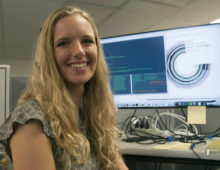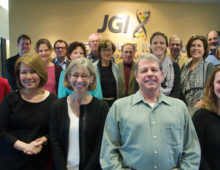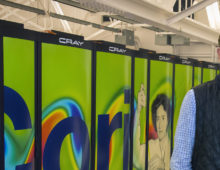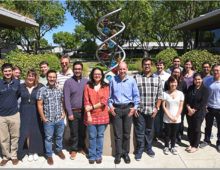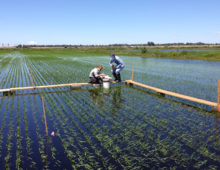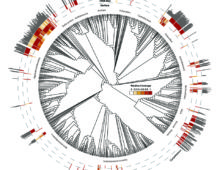From September 18-22, 2017, we introduce you to 5 postdocs at the JGI in honor of National Postdoc Appreciation Week, which recognizes the contributions of these early career researchers. Through a series of hard-hitting questions, we find out what drives each one. What do you work on? The products of microbial metabolism have biotechnological…
Meet a JGI Postdoc: Jess Jarett
From September 18-22, 2017, we introduce you to 5 postdocs at the JGI in honor of National Postdoc Appreciation Week, which recognizes the contributions of these early career researchers. Through a series of hard-hitting questions, we find out what drives each one. What do you work on? I work on the Microbial Dark Matter…
National Microbiome Data Collaborative Now on Trellis
“At the dawn of the third decade of microbial genomics, and well into the information age, the establishment of a national microbiome data center can pave the way to understanding the Earth’s microbiome.” –Nikos Kyrpides Following the June 2017 ASM Microbe Town Hall on “Envisioning a National Microbiome Data Collaborative,” everyone interested is encouraged to…
Nikos Kyrpides Named 2018 ASM USFCC/J. Roger Porter Awardee
Congratulations to Nikos Kyrpides, JGI’s Prokaryote Super Program head, who was recently selected as the 2018 USFCC/J. Roger Porter Award recipient by the American Society for Microbiology (ASM). This award recognizes outstanding efforts by a scientist who has demonstrated the importance of microbial biodiversity through sustained curatorial or stewardship activities for a major resource by…
A Social Science Experience
2017 Summer Interns Share Highlights of their time at JGI In 2017, JGI hosted 15 summer interns ranging from high schoolers through graduate school. Many of the students came to the JGI through ongoing partnerships dedicated toward training the next generation of scientific talent. Two of the high school students are among the Biotech Partners…
Scaling Microbial Genomics Discoveries for Ecosystem Modeling
Nutrient availability in model wetlands helps regulate microbial metabolism and soil carbon cycling rates The Science Studying microbial communities in San Joaquin Delta rice fields, researchers linked microbial metabolism and nutrient availability to soil carbon cycling rates. The Impact Establishing the inter-relationships among microbial metabolism, nutrient availability and soil carbon cycling rates is critical to…
C. Titus Brown, University of California, Davis
How long have you collaborated with the JGI? I’m just starting my first partnership with JGI soon, but I’ve been working as part of larger JGI collaborations for about 15 years. I also worked with Jim Tiedje and Janet Jansson on the Great Prairie Grand Challenge soil sequencing project, which started about 10 years ago…
DOE User Facilities Partner for Greater Scientific Impact
EMSL and DOE JGI announce FY 2018 FICUS projects Two Department of Energy user facilities, the Environmental Molecular Sciences Laboratory (EMSL) and the Joint Genome Institute (JGI), have selected 14 proposals from a joint call for 2018 research under the Facilities Integrating Collaborations for User Science (FICUS) initiative. This was the fifth FICUS call between EMSL…
Defining Standards for Genomes from Uncultivated Microorganisms
Expanding minimum information standards for single-cell genomics, metagenomics datasets. During the Industrial Revolution, factories began relying on machines rather than people for mass production. Amidst the societal changes, standardization crept in, from ensuring nuts and bolts were made identically to maintain production quality, to a standard railroad gauge used on both sides of the Atlantic….
Tracking Microbial Succession in Petroleum Wells
Offshore subsurface reservoirs demonstrate human impacts on well microbiomes. The Science Microbes are invisible to the naked eye, but play key roles in maintaining the planet’s biogeochemical cycles. In the Earth’s subsurface, microbes have adapted to thrive in the relatively stable extreme conditions. To learn more about how some of these populations respond to disruptions…

